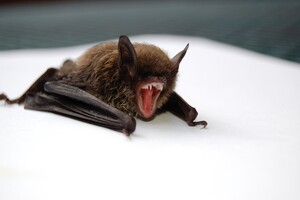It is resistant to antibodies that appear after vaccination.

Scientists discovered in bats living in the territory Russia, a new dangerous strain of coronavirus. In this regard, researchers call for the development of a universal vaccine as soon as possible. Otherwise, they believe, the world could face a new, more deadly, pandemic, reports Science alert.
The new virus, known as “Hosta-2”, like SARS-CoV-2, is covered spike proteins that allow it to infect human cells using the same “entrances”. Scientists are concerned that the virus is resistant to monoclonal antibodies and serum produced after vaccination against the coronavirus.
Read also: The Ministry of Health announced an increase in the incidence of COVID-19 and urged Ukrainians to get vaccinated
< p>In other words, it is impossible to defeat a new virus using existing methods. Even antibodies that appear after infection with the Omicron strain are not effective against it.
Scientists discovered Hosta-2 and another virus known as Hosta-1 in 2020. None of them are closely related to SARS-CoV-2. But further research revealed disturbing features in “Khost-2”.
In the laboratory, this bat pathogen was able to use the angiotensin-converting enzyme 2 (ACE2) receptors on human liver cells to infect tissues in much the same way as SARS-CoV-2. The receptor-binding domains of its spike proteins also showed complete resistance to monoclonal antibodies activated by the COVID-19 vaccine.
“Genetically, these strange Russian viruses were similar to some others that had been found elsewhere around the world, but because they were not similar to SARS-CoV-2, no one thought they might be interesting for research. But when we looked at them more closely, we were very surprised to find that they can infect human cells. This slightly changes our understanding of these viruses, where they come from and what regions they are concerned about,” said virologist Michael Letko from Washington State University.
“Hosta-2” found small horseshoe bats in bats that live in Sochi National Park. The same species is common in Europe and North America. It is not yet known whether the virus can be transmitted from animals to humans in real life, but the results of laboratory studies show that it is possible.
If “Hosta-2” infects a person or an animal together with another virus, this can lead to the appearance of a completely new variant of the coronavirus. “Hosta-1” could not independently attach to human cells in laboratory conditions. But when an enzyme, an eating protein, was added to it, the infection occurred.
Related video
In September, the head of the World Health Organization, Tedros Adhanom Ghebreyesus, announced that the world is already close to the end of the pandemic. COVID-19.The spread of vaccines and treatments has helped halt deaths and hospitalizations, and the Omicron variant, which appeared late last year, causes less severe disease.
See Special Topic: The World's Coronavirus
span> Covid-19 will stay with us like the flu – the version of the National Health Service In Ukraine, the number of newly infected with the coronavirus is increasing again. Scientists have discovered unexpected consequences of the COVID-19 pandemic The number of cases of early puberty in girls has increased. More than 16,000 people fell ill with COVID-19 in Ukraine in a week – Ministry of Health Ministry of Health will again publish data on the incidence of coronavirus and the vaccination campaign. A new wave of covid and Ukraine's readiness for chemical and nuclear attacks Interview with the chief state sanitary doctor Ihor Kuzin The incidence of COVID-19 is increasing in Ukraine The number of hospitalizations of covid patients is also increasing.




